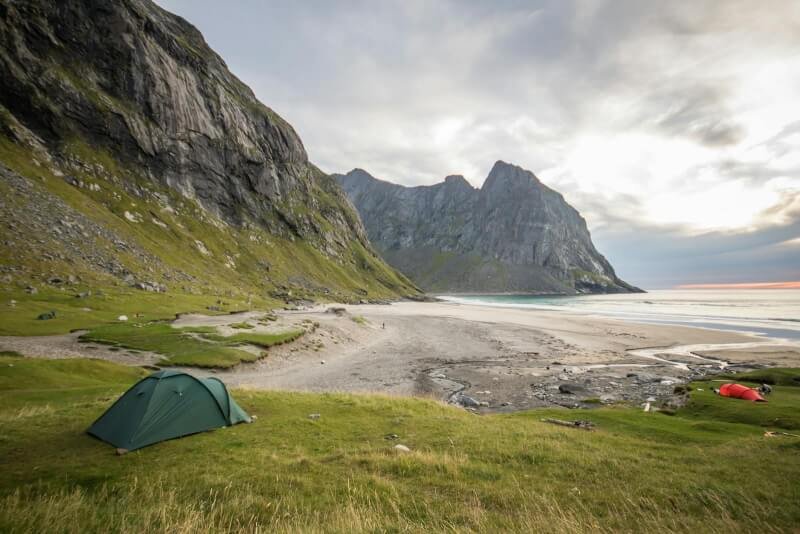So you’ve made the decision to embark on the exciting journey of camping, but you’re unsure which camper is the best fit for your needs? Look no further! In this article, we will guide you through the process of selecting the perfect beginner camper that will enhance your camping experience and provide you with unforgettable adventures. With a multitude of options available, we will help you narrow down your choices and find the camper that meets your budget, preferences, and desired camping style. Get ready to hit the road and create lasting memories in your ideal beginner camper!

Consider Your Budget
Decide on a Budget Range
When choosing a beginner camper, it’s important to consider your budget range. Determine how much you are willing to spend on a camper and set a realistic range that fits within your financial means. By having a budget range in mind, you can narrow down your options and focus on campers that are affordable for you.
Factor in Long-term Costs
Aside from the initial purchase price of the camper, it’s crucial to factor in long-term costs. This includes expenses such as maintenance, repairs, insurance, and campground fees. Consider the average costs associated with owning and using a camper to ensure that it aligns with your budget in the long run.
Consider Financing Options
If your budget doesn’t allow for an outright purchase, consider exploring financing options. Many lenders offer loans specifically for purchasing campers, with flexible repayment terms. Before committing to a financing plan, evaluate the interest rates, monthly payments, and overall affordability. Ensure that the financing option you choose fits comfortably within your budget.
Determine Your Camping Style
Define Your Camping Goals
When choosing a beginner camper, it’s essential to define your camping goals. Determine the purpose of your camping trips—are you planning to camp in remote areas, explore national parks, or have a more comfortable camping experience? Understanding your camping goals will help you narrow down the camper options that best suit your needs.
Consider the Seasons and Climate
Different campers are designed to withstand various weather conditions. Consider the seasons and climate you will be camping in to determine the level of insulation, heating, and cooling capabilities you require. If you plan to camp year-round or in extreme weather conditions, opt for a camper that is well-equipped to handle such conditions.
Evaluate Your Comfort Level
Each camper type offers a different level of comfort. Consider how important comfort is to you during your camping trips. If you prefer more space, amenities, and conveniences, then larger campers like motorhomes or travel trailers may be more suitable. On the other hand, if you enjoy a more simplistic and minimalistic camping experience, a tent or pop-up camper might be a better fit.
Evaluate Camper Types
Tent Camping
Tent camping is a classic and affordable option for beginner campers. Tents provide a sense of connection with nature and offer the flexibility to camp in various locations. They are lightweight, easy to set up, and usually more budget-friendly. However, they may not provide the same level of comfort and amenities as other camper types.
Pop-Up Campers
Pop-up campers combine the benefits of tents and traditional RVs. They are compact when folded, making towing and storage easier, but expand to provide additional space when unfolded. They offer more amenities than tents, such as a small kitchenette and sleeping quarters. Pop-up campers are suitable for those seeking a comfortable camping experience with the flexibility of tent camping.
Travel Trailers
Travel trailers are a popular choice for beginner campers due to their versatility. They come in various sizes and layouts, offering comfortable living spaces, sleeping quarters, and amenities such as kitchens and bathrooms. Travel trailers are towed behind a vehicle, enabling campers to unhitch and use their vehicle for exploration and errands.
Fifth Wheel Trailers
Similar to travel trailers, fifth wheel trailers are towed behind a vehicle. However, they require a specialized hitch installed in the bed of a pickup truck. Fifth wheel trailers provide a more spacious living area and often have additional slide-outs, expanding the living space even further. They are well-suited for those who want a more luxurious and spacious camping experience.
Class B Campervans
Class B campervans, also known as camper vans or conversion vans, offer a compact and maneuverable option for beginner campers. They are built on a van chassis and usually include basic amenities such as sleeping quarters, a small kitchenette, and a bathroom. Class B campervans are suitable for solo travelers or couples looking for a streamlined and efficient camping experience.
Class C Motorhomes
Class C motorhomes are medium-sized RVs built on truck chassis. They offer more living space and amenities than Class B campervans, including separate sleeping quarters, a full kitchen, and a bathroom with a shower. Class C motorhomes are suitable for small families or groups who value comfort and convenience while still being relatively easy to maneuver.
Class A Motorhomes
Class A motorhomes are the largest and most luxurious option for beginner campers. They resemble a bus in terms of size and layout. Class A motorhomes offer spacious living areas, multiple sleeping quarters, full-size kitchens, and bathrooms with amenities such as showers and bathtubs. They provide the utmost comfort and luxury for extended camping trips or full-time living.
Assess Camper Size and Layout
Determine the Number of Occupants
Consider the number of people who will be camping with you to determine the appropriate camper size and layout. Ensure that there are enough sleeping quarters and living spaces to accommodate everyone comfortably. If you plan on inviting guests or having additional family members join your camping trips, opt for a camper with extra sleeping capacity.
Consider Sleeping Arrangements
Evaluate the sleeping arrangements offered by different camper types. Some campers have fixed beds, while others offer convertible or fold-out options. Determine your preference and ensure that the camper can accommodate your sleeping needs. Additionally, consider the comfort level of the sleeping arrangements to ensure a good night’s sleep during your camping adventures.
Evaluate Dining and Living Spaces
Assess the available dining and living spaces within the camper. Consider the size of the dining area and the number of people it can comfortably seat. Evaluate the layout and functionality of the living area, ensuring it meets your needs for relaxation and socializing. If you enjoy cooking or entertaining while camping, look for campers with adequate kitchen and seating space.
Examine Bathroom and Kitchen Facilities
The bathroom and kitchen facilities provided by a camper can greatly impact your camping experience. Consider the size and functionality of the bathroom, including the presence of a toilet, shower, and sink. In terms of the kitchen, evaluate the cooking appliances, sink, storage space, and overall usability. Ensure that the bathroom and kitchen facilities meet your needs and preferences for comfort and convenience.

Research Campground Facilities
Look into Campground Amenities
Before finalizing your beginner camper choice, research the amenities offered at campgrounds you plan to visit. Some campgrounds provide electricity, water hookups, and dumping stations, while others offer additional amenities such as WiFi, swimming pools, or recreational facilities. Consider which campground amenities are important to you and choose a camper that can easily connect to or utilize those amenities.
Consider Accessibility and Location
Evaluate the accessibility and location of campgrounds in relation to your desired camping destinations. Ensure that the camper you choose is suitable for accessing and maneuvering within the campgrounds you plan to visit. Consider factors such as road conditions, campground size restrictions, and the proximity to attractions or nature trails.
Evaluate Availability
Depending on the time of year and popularity of certain campgrounds, availability can vary greatly. Some campgrounds require reservations well in advance, especially during peak camping seasons. Consider the availability of campsites and the likelihood of securing a spot for your camper. Plan ahead and make reservations early if necessary to avoid disappointment.
Consider Towing or Driving Abilities
Assess Towing Capacity
If you choose a camper that requires towing, it’s important to assess your vehicle’s towing capacity. Check your vehicle’s towing specifications, including weight limits and towing capabilities. Ensure that your vehicle can safely tow the camper you have in mind, considering the weight of the camper itself as well as any additional cargo or equipment you plan to bring along.
Factor in Fuel Efficiency
Towing a camper can have an impact on your vehicle’s fuel efficiency. Heavier campers or campers with less aerodynamic designs can put more strain on your vehicle and decrease fuel efficiency. Evaluate the fuel consumption and efficiency of your vehicle when towing a camper to determine the potential impact on your budget and overall travel plans.
Evaluate Maneuverability
Consider your driving abilities and confidence when it comes to maneuvering a camper. Larger campers, such as travel trailers or motorhomes, require more skill and experience for safe and precise handling. If you are a beginner driver or have limited experience with towing or driving larger vehicles, opt for a smaller and more maneuverable camper type like a pop-up camper or campervan.

Examine Storage and Cargo Capacity
Assess Outdoor Storage Options
Consider the outdoor storage options available for your chosen camper type. Some campers may have exterior storage compartments or racks for items such as camping gear, bikes, or additional equipment. Assess the storage capacity and accessibility of these outdoor storage options to ensure that you can bring along everything you need for your camping adventures.
Consider Indoor Storage Space
Evaluate the indoor storage space within the camper. Look for closets, cabinets, and under-bed storage that can accommodate your clothing, kitchenware, and other belongings. Assess the functionality and organization of these storage spaces to determine if they meet your needs. Having adequate indoor storage can help keep your camper tidy and provide a comfortable living space.
Evaluate Weight and Cargo Capacity
Consider the weight and cargo capacity of the camper. This includes not only the weight of the camper itself but also the maximum weight it can safely carry, including cargo and passengers. Evaluate your cargo needs and ensure that the camper’s weight and cargo capacity can accommodate all the items you plan to bring along. Overloading a camper can affect its performance and safety.
Analyze Maintenance and Upkeep
Consider Maintenance Requirements
Different camper types have varying maintenance requirements. Consider the upkeep and maintenance tasks involved in owning and using a specific camper. Some campers may require more frequent inspections, cleaning, or maintenance procedures. Assess your willingness and ability to perform these tasks or budget for professional maintenance services accordingly.
Evaluate Repair and Service Costs
When researching different camper types, it’s important to evaluate the potential repair and service costs. Some campers may have specialized components or systems that can be more expensive to repair or replace. Look into the availability of parts and the average costs of repairs for the camper you are considering. Factor in these potential costs when assessing the long-term affordability of a camper.
Examine Warranty Coverage
Check if the camper you are interested in comes with a warranty and consider the coverage it provides. A warranty can offer peace of mind, especially for beginner campers who may be unfamiliar with the maintenance and upkeep required. Evaluate the duration and extent of the warranty coverage, as well as any additional services or support provided by the manufacturer or dealership.

Read Reviews and Seek Recommendations
Research Customer Reviews and Ratings
Reading customer reviews and ratings can provide valuable insights into the experiences of other campers. Look for reviews of the specific camper type or model you are considering to gain an understanding of its performance, durability, and overall user satisfaction. Pay attention to common themes or issues raised in the reviews to make an informed decision.
Seek Advice from Experienced Campers
Reach out to experienced campers or join online camping communities to seek recommendations and advice. Experienced campers can share their firsthand knowledge and offer valuable tips and insights based on their own camping experiences. They may be able to recommend specific camper types or models that align with your needs and provide additional guidance throughout your camper selection process.
Prepare for Insurance and Licensing
Research Insurance Requirements
Before purchasing a camper, research the insurance requirements specific to your location. Different states or countries may have varying insurance regulations for campers. Determine the minimum coverage required as well as any additional coverage options that may be beneficial. Shop around for insurance quotes and compare policies to find the one that best fits your needs and budget.
Evaluate Licensing and Registration Process
Familiarize yourself with the licensing and registration process for the camper you choose. Depending on its size and classification, different campers may require specific licenses or registrations. Research the requirements in your jurisdiction and ensure that you have all the necessary documentation and permits before hitting the road with your new camper.
In conclusion, choosing the best beginner camper for your needs requires careful consideration of your budget, camping style, camper types, size and layout, campground facilities, towing or driving abilities, storage and cargo capacity, maintenance and upkeep, reviews and recommendations, as well as insurance and licensing requirements. By following the outlined steps and evaluating these factors, you can make an informed decision that will enhance your camping experiences and create lasting memories. Happy camping!



